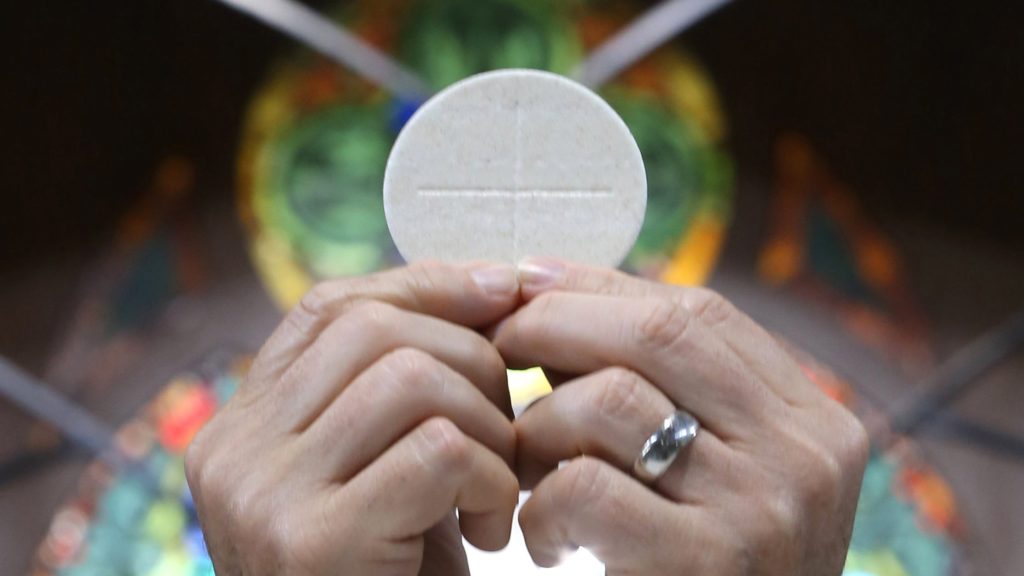Not long ago I attended a Catholic talk. We heard a reflection by Thich Nhat Hanh, a poem by Rumi, and excerpts from a non-denominational pop psychologist.
My mind wandered. I tried to pray the rosary. But then the speaker posed a question in the face of which I could remain silent no longer.
“Do we love our religion enough to set it aside?” he asked.
My hand shot up. “Isn’t the question do we love our religion enough to remain faithful in a world that is virulently hostile to it? To be Catholic in this culture means we are always setting our religion aside! Isn’t the question, do we love our religion enough to support one another as we try to call ourselves higher and follow Christ?”
“Everything is not ‘like’ everything else,” I ranted on. “There is nothing ‘like’ Christ — the alpha and the omega — anywhere in the cosmos! If everything is the same as everything else, we end up with a blob! If I did not believe in the one true Catholic and apostolic Church, I wouldn’t have staked my life on it!”
I felt like Flannery O’Connor at that famous New York dinner when fellow author Mary McCarthy dared to call the Eucharist a symbol — to which O’Connor shakily rejoined: “If it’s a symbol, the hell with it!”
I realize that priests, evangelizers, and lecturers have a difficult job. I struggle with that job as a writer.
On the one hand we want to be cognizant of the participant who has perhaps been deeply wounded by the Church, who in fear and trembling is putting out tentative feelers. Of course we want to warmly welcome, incorporate, do everything in our power to invite that person in.
Of course we want to include everyone: the lonely, the disenfranchised, the outsider. If you’re anything like me, in fact, that outsider is you.
But our wounds aren’t healed by infantilizing the victim; by avoiding the cross. They’re healed by sharing the Sinless Victim who suffers with, in, through, as us. They’re healed by contact with reality.
What does the suggestion to set our religion aside, in the course of a Catholic talk, say to the husband who’s at Mass every day struggling to avoid the temptation of an extramarital affair? To the single mother working three jobs to support her kids and ducking into church for 10 stolen minutes to pray? To the seminarian who, sweating tears of blood, is trying to discern his possible vocation as a missionary; to the believer in prison for protesting nuclear weapons; to the solitary older woman or man, of which our churches are full, toiling away invisibly in the vineyard ravenous for a drop of the Way, the Truth, the Life: for a word of confirmation that they haven’t been abandoned?
That none of that matters? That no effort is required? That Christ should conform to us and our comfort and ease, rather than that we should at least try — knowing we will fail — to him?
In New York City a few weeks ago, I attended a Sunday Mass celebrated by Father Donald Haggerty, a diocesan priest at St. Patrick’s Cathedral and the author of several books on contemplative prayer.
The Gospel was John 6:41–51, in which Jesus says, “I am the bread that came down from heaven.”
Haggerty told a story that took place when he was assigned to another Manhattan church. During adoration one day a man came in and stood at the back of the sanctuary looking puzzled. “Can I help?” Father quietly asked.
The man was Muslim, it turned out, and pointing to the monstrance, inquired, “What is that?”
“That is the body of Christ, our Lord,” Haggerty replied. “That is God made man and come down to earth to be with us, in the flesh.”
The man appeared staggered. “If that is true, if I were Catholic,” he said, “I would prostrate myself before that body. I would lie there before God every day for hours.”
The transubstantiation, in other words, is a tremendous, earth-shattering miracle. And a related miracle, one we may not often ponder, Father pointed out, is that afterward the body of Christ still appears visually under the species of bread, in order that we may eat of it.
“To miss Sunday Mass is a serious sin,” Haggerty continued, and I inwardly cheered. A convert, I came into the Church in 1996 mercifully devoid of the pre-Vatican II wounds so many cradle Catholics carry. My heart goes out to all such people; I offer my life each day, in fact, toward healing the wounds of my brothers and sisters, however and whenever they were incurred.
Still, if anything, I regret having missed those bracing times. So frightened have we become of alienating anyone by actually mentioning Christ that we seem to have gone to the other extreme.
That’s not to fetishize the Eucharist; it’s to acknowledge that he is the vine; we are the branches. Without him, we can do nothing.
Without the Eucharist I, for one, can’t truly include anyone but myself.
In the Eucharist lives the grain of wheat that abideth alone — but if it falls to the ground and dies, bears much fruit.

